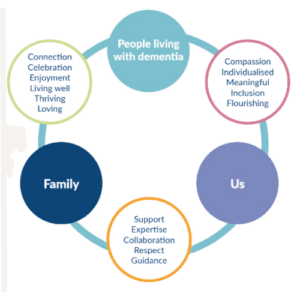Five ways to communicate to someone living with dementia
Communicating with someone living with dementia can be challenging, but there are effective strategies that can make a real difference. In this article, we’ll explore some of these techniques, including our own ‘EVER’ model. Developed by our in-house Admiral Nurse, ‘EVER’ guides our approach to dementia care and highlights key communication methods.
Dementia Model
Our dementia model ‘EVER’ stands for:

Engagement: These are the different techniques used to approach communication and to build rapport.
Validation: This method is used to connect with people living with dementia emotionally through acknowledging their feelings.
Enrichment: Enables people with dementia to live full, meaningful lives.
Relationships: Acknowledging the importance of empathetic communication with others and supporting family members is key.
This model incorporates the different techniques we use to approach communication for those living with dementia such as building rapport, gentle close eye contact, empathetic communication and mirroring body language. These techniques are used to build trust, and to make the person feel comfortable and understood.
If you are taking care of a loved one who is living with dementia, here are five ways to communicate effectively:
- Don’t ask direct questions: Being unable to recall factual information can be distressing.
- Give them space to talk: Allow them to guide the conversation. Stop talking when they start, and avoid interrupting them.
- Avoid contradicting them: Even when they say things that are inaccurate, don’t tell them they’re wrong as this is at odds with their world view.
- Choose an appropriate time: People with dementia go through highs and lows. Make sure you match your approach to their mood.
- Focus on the emotional aspect: People with dementia still process emotions. Focus on making it a pleasurable experience, rather than focusing on a specific topic.
If you would like to learn more about how to support a loved one with dementia, call on our friendly team today.
Discover more
The Good Care Group partners with Age Scotland
We are proud to announce that The Good Care Group is now an Associate Group Member of Age Scotland, the national charity for older people. By joining Age Scotland’s community we are strengthening our commitment to supporting older adults across...
Read moreEnhancing independence by partnering with Mobility Hire
At The Good Care Group, we believe that staying in the home you love should never mean compromising on your independence. Our mission is to provide outstanding live-in care that empowers our clients to live life on their own terms....
Read moreThe Good Care Group Employee Awards 2025
Each year, The Good Care Group proudly hosts its Employee Awards to honour and celebrate the exceptional contributions of our team members across the organisation. These awards provide a special opportunity for anyone to nominate colleagues who excel in their...
Read moreRead why our clients choose us
Awards & accreditations
Talk to us about your care needs
To talk about your care needs, contact one of our friendly advisors.
Calls from landlines are free.












